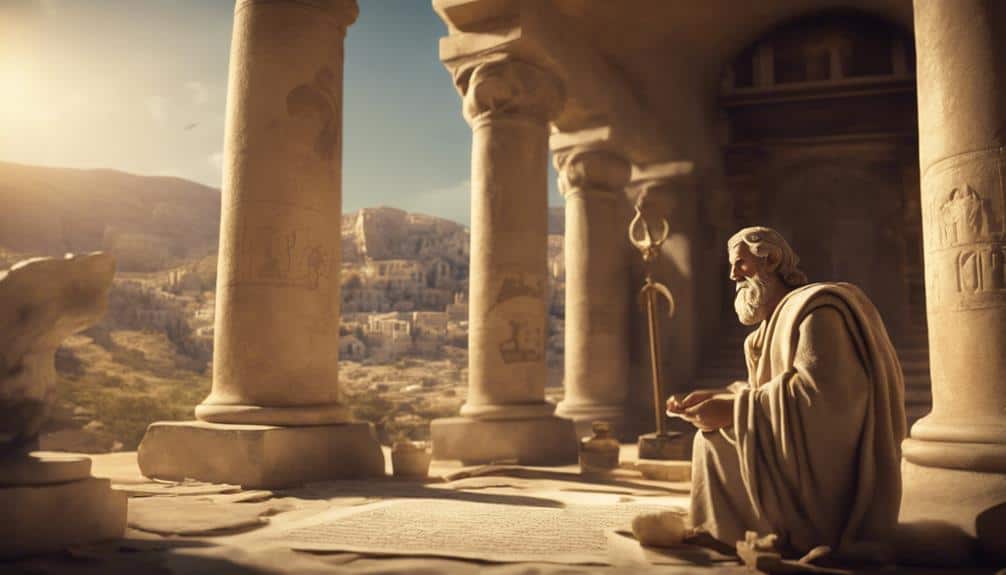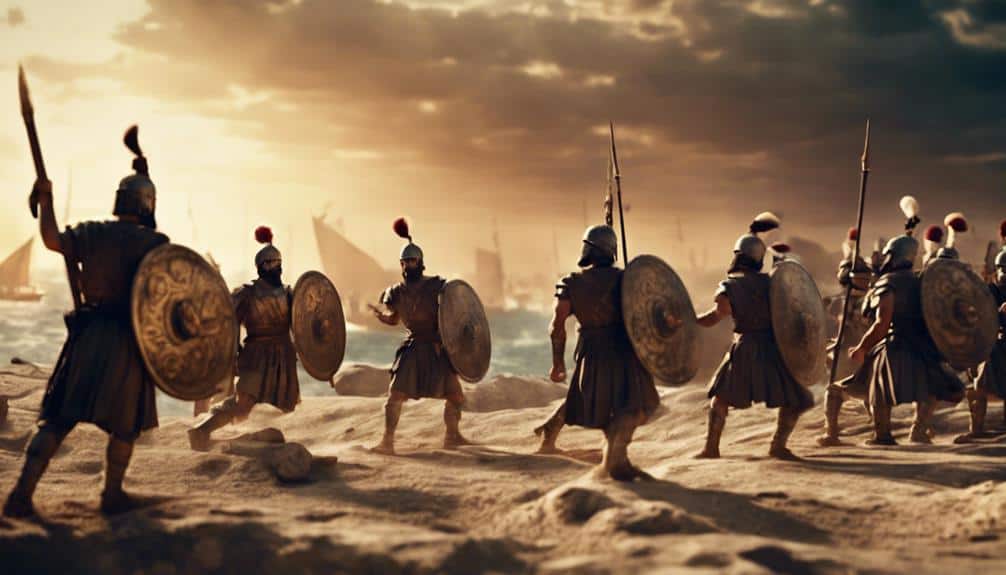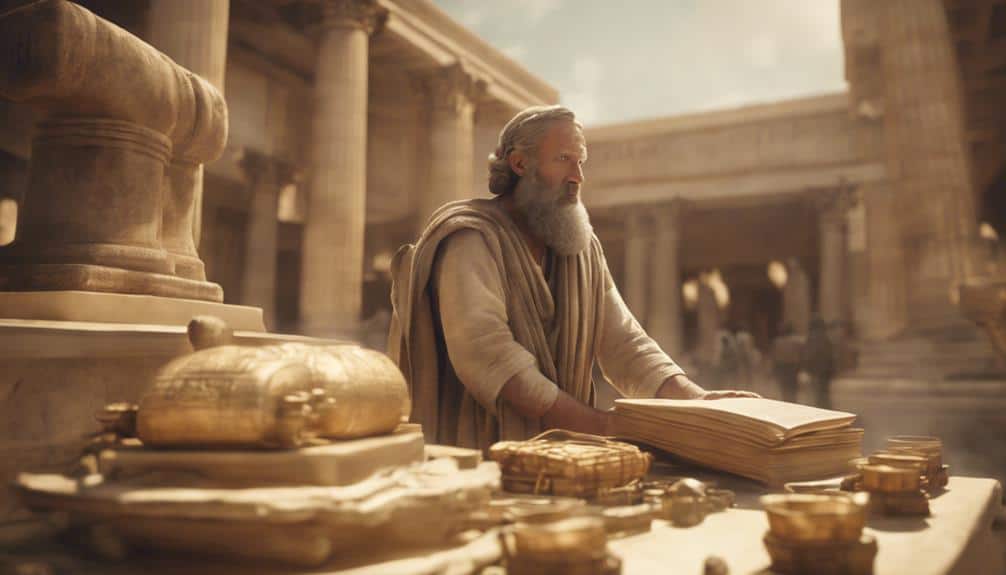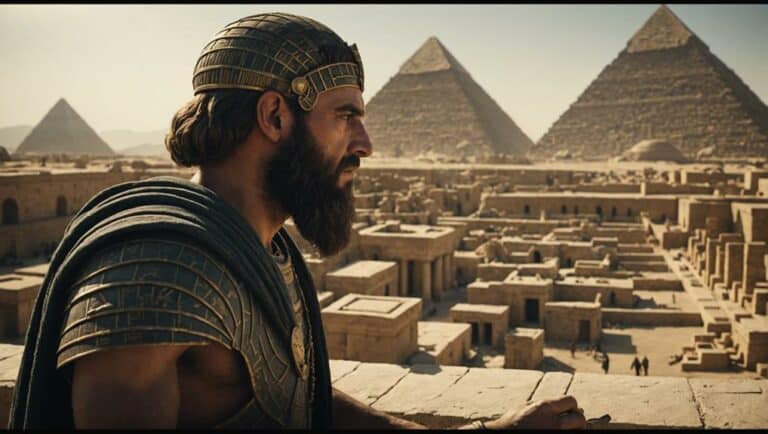Herodotus, often hailed as the 'Father of History,' revolutionized historical documentation with his blend of meticulous observation, personal inquiry, and myth in 'The Histories.'
Born around 485 B.C., his captivating narrative style and critical analysis of the Greco-Persian Wars left an indelible mark on the way we record history.
Early Life and Background
Born around 485 B.C. in Halicarnassus, a city within the Persian Empire, Herodotus's early life was shaped by the political turmoil and exile experienced by his wealthy Greek-Carian merchant family. The family's opposition to the tyrant Lygdamis led to their forced relocation to Samos. This exile influenced Herodotus's perspective and later endeavors.
In Samos, Herodotus was exposed to diverse cultures and ideas, setting the stage for his future travels. His background in a family of merchants likely instilled in him a curiosity about the broader world, prompting him to travel extensively across Persian territories. These travels enabled him to conduct personal inquiries and collect autopsies (firsthand accounts), laying the groundwork for his historical documentation.
Despite criticisms for including fables in his narratives, Herodotus earned the title 'Father of History' because he systematically recorded events of the ancient world. His dedication to capturing a wide range of perspectives, even if they included mythical elements, highlighted his thorough approach to history.
Understanding Herodotus's early life and background provides insight into his motivations and methods, shaping his important contributions to the historiographical tradition.
Origins of 'The Histories'

Herodotus' seminal work, 'The Histories,' emerged from his relentless pursuit of understanding the intricate causes behind the Greco-Persian Wars and the broader Persian imperial perspective. As an analytical historian, Herodotus sought to go beyond mere recounting of events. To achieve this, he collected autopsies and conducted personal inquiries during his extensive travels across Persian territories, piecing together a detailed narrative.
Unlike earlier logographies, which were straightforward chronicles of events, Herodotus' narrative approach was revolutionary. He incorporated vivid observations, enthralling stories, and even myths gathered from various regions. This method allowed him to weave a more nuanced and engrossing account of the Persian Wars, providing readers with a deeper understanding of the multifaceted causes and effects.
Herodotus' ability to compile a complete story explaining the Persian Wars set him apart. He warned readers about the unverified nature of some accounts, showcasing his commitment to critical analysis. This meticulous approach eventually earned him celebrity status in Athens, where he was honored with a prize of 10 talents for his contributions to historical inquiry.
Through 'The Histories,' Herodotus established a new standard for documenting the ancient world, blending empirical research with narrative charm.
The Greco-Persian Wars

Herodotus extensively covered the Greco-Persian Wars, offering a detailed analysis of the causes behind these monumental conflicts. You'll find his accounts of key battles like Marathon and the Persian Empire's strategic maneuvers both informative and compelling.
Through his work, Herodotus aimed to provide a thorough understanding of the motivations, alliances, and rivalries that defined this critical period in ancient history.
Causes of the Wars
Delving into the causes of the Greco-Persian Wars, one must consider the Persian Empire's expansionist policies and the reactions of the fiercely independent Greek city-states. Herodotus, in his in-depth account, meticulously chronicled these factors.
The Persian Empire, under leaders like Darius and Xerxes, sought to expand its dominion, inevitably clashing with the Greek city-states that valued their autonomy.
Herodotus identified several motivations behind these conflicts:
- Persian Imperial Ambitions: The desire to extend control over the rich and strategically important Greek territories.
- Greek Defiance: The independent nature of the Greek city-states, particularly Athens and Sparta, which resisted subjugation.
- Retaliation and Revenge: The Greeks' assistance to the Ionian Revolt provoked Persian invasions, culminating in pivotal events like the Battle of Marathon.
These elements fueled a series of engagements that Herodotus documented with keen insight. He explained how the Persian invasions weren't arbitrary but driven by calculated objectives and responses to Greek provocations.
Through his extensive inquiries, Herodotus provided a detailed understanding of the underlying tensions that led to these monumental conflicts, thereby highlighting the complex interplay of power, pride, and resistance that characterized the Greco-Persian Wars.
Key Battles Analyzed
Understanding the causes of the Greco-Persian Wars sets the stage for analyzing the key battles that defined this historic conflict. Herodotus' detailed accounts provide a clear picture of these pivotal conflicts.
The Battle of Marathon saw the Greek coalition achieving a surprising victory over the Persian forces, showcasing the tactical prowess of the Greeks. This battle's outcome had significant consequences, boosting Greek morale and unity.
Next, the Battle of Thermopylae is legendary for the heroic stand of the Spartans against overwhelming Persian forces. Although it ended in defeat for the Greeks, it became a symbol of courage and resilience. Herodotus' narrative highlights the strategic importance of this battle in delaying the Persian advance.
The naval Battle of Salamis was another critical encounter where the Greek fleet decisively defeated the Persians. This victory crippled the Persian navy and shifted the momentum in favor of the Greeks.
Persian Empire's Strategy
The Persian Empire's strategy during the Greco-Persian Wars, as meticulously documented in 'The Histories', reveals an ambitious and expansive military approach aimed at consolidating power and subjugating Greece. Herodotus' detailed accounts show the empire's systematic conquests and divisions, underscoring its vast size and formidable military strength.
Xerxes, the Persian king, led a massive invasion force into Greece, demonstrating calculated military tactics designed to overwhelm the Greek city-states. Herodotus' narrative bridges the history of the Persian Empire's expansion with the pivotal battles that defined the Greco-Persian Wars.
- Vast Armies: Herodotus describes the immense numbers of Persian troops, creating an image of an almost inexhaustible military force.
- Naval Expeditions: The Persian fleet's extensive naval campaigns highlight their strategy to control both land and sea.
- Strategic Battles: Key battles, such as Thermopylae and Salamis, illustrate the tactical maneuvers and relentless pursuit of Greek subjugation.
Herodotus' thorough documentation provides insight into the Persian Empire's determination to expand its dominion. Their strategy encompassed not just brute force but also strategic planning and resource management, aiming for complete control over the ancient world.
Through these accounts, you gain a detailed understanding of the Persian Empire's military ambitions during the Greco-Persian Wars.
Herodotus' Narrative Approach

Herodotus' narrative method in 'The Histories' transformed the way historical events were recorded by blending personal observations, collected stories, and myths into a cohesive and engaging account. Unlike his predecessors, who relied on logographies, Herodotus crafted a detailed story that explored the causes of the Greco-Persian Wars and the Persian imperial worldview. His work took readers through the vast Persian territories, offering insights from his extensive travels.
By integrating various narrative elements, Herodotus provided a thorough view of the rise and fall of the Persian Empire, making 'The Histories' a seminal work in historical documentation. He didn't shy away from including unverified stories, but he was careful in warning readers about their potential inaccuracies. This approach allowed him to present a multifaceted perspective, combining factual events with cultural and mythical contexts.
Through 'The Histories,' Herodotus not only chronicled the events leading to the wars but also illustrated the broader implications of these conflicts. His narrative method set a new standard, moving beyond mere record-keeping to offer a dynamic and engaging exploration of history. By doing so, Herodotus made sure that his work would resonate with future generations, providing a rich tapestry of the ancient world.
Criticism and Legacy

Critics often challenged Herodotus for incorporating fables and unverified stories into his historical accounts, questioning the reliability of his narratives. You might wonder if these elements undermine the credibility of his work. Indeed, Thucydides, another prominent historian, labeled Herodotus the 'first liar,' sparking ongoing debates about historical accuracy.
Herodotus' approach to political history transformed it into a form of literature, blending facts with engaging storytelling. This method has been scrutinized for its subjective elements, yet it's hard to deny the enduring appeal of his narrative style.
- Epic tales of far-off lands and mythical creatures
- Vivid descriptions of historical events and figures
- Intriguing anecdotes that breathe life into ancient times
While some argue that Herodotus' inclusion of fables and unverified stories detracts from the factual integrity of his work, others appreciate the richness it brings to his accounts. His storytelling legacy endures, influencing future historians and writers to this day.
Herodotus' Lasting Influence

While some question the factual integrity of his work, you can't overlook the profound impact Herodotus has had on the field of history. Known as the 'Father of History,' Herodotus' pioneering work in documenting historical events marked him as the first historian. His detailed accounts of the Greco-Persian Wars and the Persian Empire provide invaluable insights into ancient civilizations.
Herodotus' method of weaving personal observations and firsthand accounts into his narratives established a new standard for historical storytelling. By incorporating diverse narratives and cultural insights, he set a precedent that future historians and anthropologists would follow. His approach wasn't just about chronicling events; it was about understanding the human context behind them.
Despite criticisms regarding potential inaccuracies, Herodotus' legacy endures. His detailed documentation of historical events remains a cornerstone in the study of history and anthropology. By examining his work, you get a window into the lives, customs, and conflicts of ancient civilizations.
His contribution goes beyond mere documentation; it's about capturing the essence of the times he lived in. His influence on the field is both undeniable and enduring, cementing his place in history.


